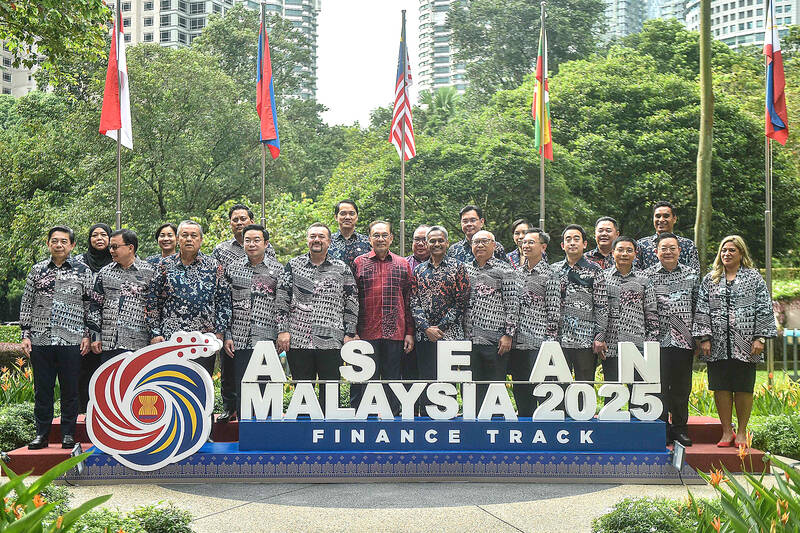Economic ministers of the ASEAN regional bloc committed yesterday “to not impose any retaliatory measures” against the US over sweeping tariffs and said they were ready to engage in talks.
The ministers said retaliation would not be beneficial as the US was ASEAN’s biggest source of foreign direct investments and second-largest trading partner last year.
“ASEAN, being the fifth-largest economy in the world, is deeply concerned over the recent introduction of unilateral tariffs by the US, including the tariffs announced on 2 April 2025 and subsequently the most recent suspension on 9 April 2025,” the ministers said in a statement issued after a video conference meeting.

Photo: AFP
Despite that, the ministers said they were ready “to engage in a frank and constructive dialogue with the US to address trade-related concerns.”
“Open communication and collaboration will be crucial to ensuring a balanced and sustainable relationship. In that spirit, ASEAN commits to not impose any retaliatory measures in response to the US tariffs,” they said.
The special meeting was chaired by Malaysian Minister of Investment, Trade and Industry Tengku Zafrul Aziz. Malaysia holds the rotating chair of the regional bloc, which is home to more than 650 million people.
ASEAN members, which count on the US as their main export market, were among those hit with the toughest levies by US President Donald Trump.
Manufacturing powerhouse Vietnam was hit with a 46 percent tariff on exports to the US, while neighboring Cambodia — a major producer of low-cost clothing for big Western brands — was slapped with a 49 percent duty.
The other ASEAN members hit with hefty tariffs are Laos (48 percent), Myanmar (44 percent), Thailand (36 percent) and Indonesia (32 percent).
Malaysia was hit with a lower tariff of 24 percent and Brunei also faces a 24 percent tariff, while the Philippines was hit with 17 percent and Singapore 10 percent.
Following chaos in the global markets, Trump on Wednesday announced a 90-day pause on the tariffs.
European Commission President Ursula von der Leyen yesterday welcomed Trump’s decision to temporarily halt most US tariffs.
The EU’s executive commission said yesterday it would put trade retaliation measures on hold for 90 days to match Trump’s pause on his sweeping new tariffs and leave room for a negotiated solution.
Von der Leyen said that the commission, which handles trade for the bloc’s 27 member countries, “took note of the announcement by President Trump.”
New tariffs on 20.9 billion euros (US$23 billion) of US goods will be put on hold for 90 days because “we want to give negotiations a chance,” she said in a statement.
However, she warned: “If negotiations are not satisfactory, our countermeasures will kick in.”
Before Trump’s announcement on Wednesday, EU member countries voted to approve retaliatory tariffs on US$23 billion in goods in response to his 25 percent tariffs on imported steel and aluminum. The tariffs were set to go into effect in stages, some on Tuesday next week and others on May 15 and Dec. 1.
Additional reporting by AP

Quanta Computer Inc (廣達) chairman Barry Lam (林百里) is expected to share his views about the artificial intelligence (AI) industry’s prospects during his speech at the company’s 37th anniversary ceremony, as AI servers have become a new growth engine for the equipment manufacturing service provider. Lam’s speech is much anticipated, as Quanta has risen as one of the world’s major AI server suppliers. The company reported a 30 percent year-on-year growth in consolidated revenue to NT$1.41 trillion (US$43.35 billion) last year, thanks to fast-growing demand for servers, especially those with AI capabilities. The company told investors in November last year that

Intel Corp has named Tasha Chuang (莊蓓瑜) to lead Intel Taiwan in a bid to reinforce relations between the company and its Taiwanese partners. The appointment of Chuang as general manager for Intel Taiwan takes effect on Thursday, the firm said in a statement yesterday. Chuang is to lead her team in Taiwan to pursue product development and sales growth in an effort to reinforce the company’s ties with its partners and clients, Intel said. Chuang was previously in charge of managing Intel’s ties with leading Taiwanese PC brand Asustek Computer Inc (華碩), which included helping Asustek strengthen its global businesses, the company

Taiwanese suppliers to Taiwan Semiconductor Manufacturing Co. (TSMC, 台積電) are expected to follow the contract chipmaker’s step to invest in the US, but their relocation may be seven to eight years away, Minister of Economic Affairs J.W. Kuo (郭智輝) said yesterday. When asked by opposition Chinese Nationalist Party (KMT) Legislator Niu Hsu-ting (牛煦庭) in the legislature about growing concerns that TSMC’s huge investments in the US will prompt its suppliers to follow suit, Kuo said based on the chipmaker’s current limited production volume, it is unlikely to lead its supply chain to go there for now. “Unless TSMC completes its planned six

Power supply and electronic components maker Delta Electronics Inc (台達電) yesterday said it plans to ship its new 1 megawatt charging systems for electric trucks and buses in the first half of next year at the earliest. The new charging piles, which deliver up to 1 megawatt of charging power, are designed for heavy-duty electric vehicles, and support a maximum current of 1,500 amperes and output of 1,250 volts, Delta said in a news release. “If everything goes smoothly, we could begin shipping those new charging systems as early as in the first half of next year,” a company official said. The new